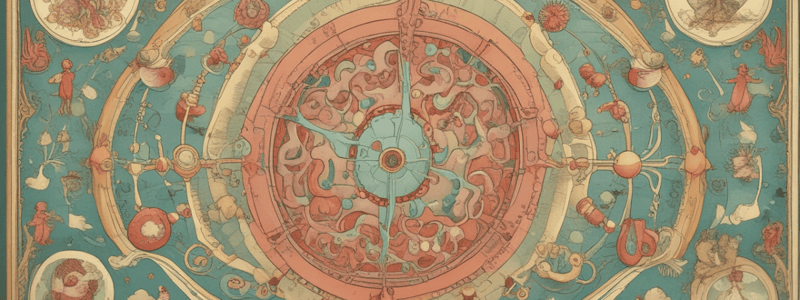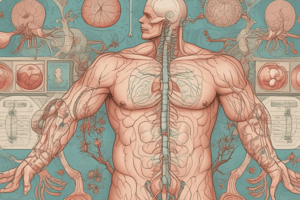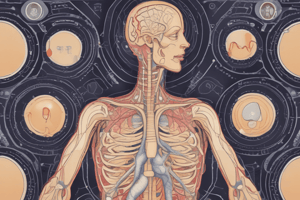Podcast
Questions and Answers
What are the chemical messengers of the endocrine system called?
What are the chemical messengers of the endocrine system called?
What is the primary difference between exocrine and endocrine glands?
What is the primary difference between exocrine and endocrine glands?
Which type of hormone is derived from cholesterol?
Which type of hormone is derived from cholesterol?
What is the role of receptors in the endocrine system?
What is the role of receptors in the endocrine system?
Signup and view all the answers
What is the second messenger system involved in?
What is the second messenger system involved in?
Signup and view all the answers
How do steroid hormones affect cellular function?
How do steroid hormones affect cellular function?
Signup and view all the answers
What is the process by which a segment of DNA is copied into RNA?
What is the process by which a segment of DNA is copied into RNA?
Signup and view all the answers
What is the term for a cell that has specific receptors for a hormone?
What is the term for a cell that has specific receptors for a hormone?
Signup and view all the answers
What type of stimuli triggers hormone release in response to changes in blood levels of ions and nutrients?
What type of stimuli triggers hormone release in response to changes in blood levels of ions and nutrients?
Signup and view all the answers
Which hormone regulates the secretion of thyroid hormones?
Which hormone regulates the secretion of thyroid hormones?
Signup and view all the answers
What is the primary function of the posterior pituitary gland?
What is the primary function of the posterior pituitary gland?
Signup and view all the answers
What is the term for the network of blood vessels that connects the hypothalamus with the anterior pituitary?
What is the term for the network of blood vessels that connects the hypothalamus with the anterior pituitary?
Signup and view all the answers
Which hormone is responsible for stimulating the growth and metabolic functions of tissues?
Which hormone is responsible for stimulating the growth and metabolic functions of tissues?
Signup and view all the answers
What is the term for hormones that prevent the anterior pituitary from secreting hormones?
What is the term for hormones that prevent the anterior pituitary from secreting hormones?
Signup and view all the answers
What is the primary function of the anterior pituitary gland?
What is the primary function of the anterior pituitary gland?
Signup and view all the answers
What is the term for the type of stimuli that involves nerve fibers stimulating hormone release?
What is the term for the type of stimuli that involves nerve fibers stimulating hormone release?
Signup and view all the answers
Study Notes
Chemical Messengers of the Endocrine System
- Hormones are the chemical messengers of the endocrine system.
Exocrine vs Endocrine Glands
- Exocrine glands release secretions through ducts to the outside of the body or onto a surface within the body.
- Endocrine glands release hormones directly into the bloodstream without the use of ducts.
Types of Hormones
- Steroid hormones are derived from cholesterol (e.g., cortisol, testosterone).
- Peptide/protein hormones are composed of amino acids (e.g., insulin, growth hormone).
- Amine hormones are derived from single amino acids (e.g., epinephrine, thyroid hormones).
- Eicosanoids are derived from fatty acids (e.g., prostaglandins).
Hormone Action
- A target cell is a cell that has specific receptors for a hormone, allowing the hormone to exert its effects on that cell.
- Receptors are proteins located on the surface or inside of a target cell that bind to specific hormones, enabling the cell to respond to the hormone's signal.
- The second messenger system amplifies the signal and initiates a cascade of cellular processes, leading to the hormone's effects.
Steroid Hormones
- Steroid hormones pass through the cell membrane and bind to intracellular receptors.
- The hormone-receptor complex then enters the nucleus and binds to DNA, altering gene transcription and ultimately protein synthesis, affecting cellular function.
Gene Transcription
- Gene transcription is the process by which a segment of DNA is copied into RNA by the enzyme RNA polymerase, leading to protein synthesis.
Stimuli for Hormone Release
- Humoral stimuli: changes in blood levels of ions and nutrients trigger hormone release (e.g., calcium levels regulate parathyroid hormone).
- Hormonal stimuli: hormones from one gland stimulate or inhibit the release of hormones from another gland (e.g., hypothalamic hormones regulate pituitary hormones).
- Neural stimuli: nerve fibers stimulate hormone release (e.g., sympathetic nervous system stimulates adrenal medulla to release epinephrine).
Hypothalamus Control of the Pituitary Gland
- The hypothalamus releases releasing and inhibiting hormones into the hypophyseal portal system, which directly influences the anterior pituitary to release or inhibit its hormones.
- The hypothalamus produces hormones (oxytocin and ADH) that are transported down nerve fibers to the posterior pituitary, from where they are released into the bloodstream.
Releasing and Inhibiting Hormones
- Releasing hormones stimulate the anterior pituitary to secrete hormones (e.g., TRH, CRH).
- Inhibiting hormones prevent the anterior pituitary from secreting hormones (e.g., somatostatin, dopamine).
Hypophyseal Portal System
- A network of blood vessels that directly connects the hypothalamus with the anterior pituitary, allowing hypothalamic hormones to quickly reach the anterior pituitary.
Anterior Pituitary Gland
- The anterior pituitary gland (adenohypophysis) is true glandular tissue.
Posterior Pituitary Gland
- Stores and releases oxytocin and antidiuretic hormone (ADH) that are produced by the hypothalamus.
Six Hormones of the Anterior Pituitary
- Growth Hormone (GH): targets liver, muscle, bone, and other tissues; stimulates growth and metabolic functions.
- Thyroid-Stimulating Hormone (TSH): targets thyroid gland; stimulates the secretion of thyroid hormones.
- Adrenocorticotropic Hormone (ACTH): targets adrenal cortex; stimulates the release of cortisol.
- Follicle-Stimulating Hormone (FSH): targets ovaries and testes; stimulates gamete production.
- Luteinizing Hormone (LH): targets ovaries and testes; stimulates the formation of corpus luteum and testosterone production.
- Prolactin (PRL): targets breast tissue; stimulates milk production.
Studying That Suits You
Use AI to generate personalized quizzes and flashcards to suit your learning preferences.
Description
Learn about the chemical messengers of the endocrine system, the differences between exocrine and endocrine glands, and the different chemical groups of hormones.



